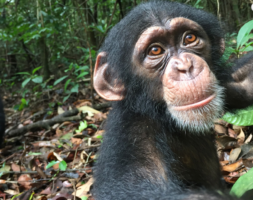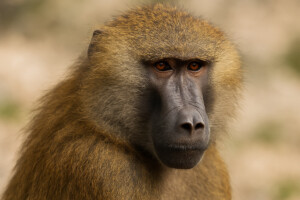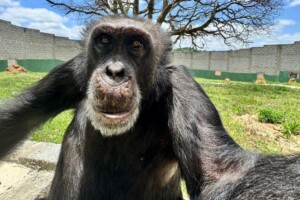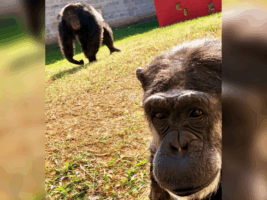Saving Peanut: Life of beloved orangutan in hands of team using human treatments
 By Audra D.S. Burch (The Miami Herald)
By Audra D.S. Burch (The Miami Herald)
The patient is under anesthesia, lying on her side in a surgical room with bright overhead lights. The nurse slips a needle into the vein so the chemicals can attack the nearly undetectable cancerous cells of Non-Hodgkin’s lymphoma. Another nurse monitors the vital signs while a third person gently strokes the patient’s back. In the corner, white-coated doctors gather, discussing her condition.
It’s a chemotherapy session — with a difference. The medical office is actually an animal clinic. The doctors include a veterinarian. And the patient is an 8-year-old orangutan — among the species closest in genetic make-up to humans — and one of the beloved stars of Jungle Island.
Over the last three months, the treatment for her cancer, an aggressive form, has been handled by a team that includes Jungle Island’s veterinarian, Dr. Jason Chatfield, and doctors and nurses from the Sylvester Comprehensive Cancer Center/University of Miami and UM’s Miller School of Medicine. Though it is not uncommon to use chemotherapy on animals, Peanut is the first documented orangutan to be treated with this particular chemo-immunotherapy regimen typically used to treat human lymphoma cases.
“The DNA of an orangutan is remarkably similar to that of humans,” said Dr. Joseph Rosenblatt, chief of the Hematology/Oncology Division at Sylvester, who is advising on the case. “They are human-like in many ways, so it makes sense for us to try to adopt as close a human approach as possible.”
Will it work? It’s hard to know. Other cancer treatments such as radiation have been used on orangutans or gorillas only a handful of times before — but doctors hope the cancer will be eradicated with the three treatments she has had so far. The plan was to give Peanut up to six treatments but last week, the team decided to stop because of the stress of undergoing multiple immobilizations and because the disease is microscopic, likely an early stage.
Now they wait, watching her progress and looking for signs of a relapse. Long-term — eight months to a year — they will monitor her through diagnostic imaging including CT scan, radiology and ultrasounds.
“Peanut has handled the process with remarkable strength and fortitude. We have learned a great deal in the process and endeavored to provide Peanut with state-of-the-art care and the best possible chance at long-term survival,” Chatfield said. “We remain hopeful that the chemotherapy was able to remove any lingering neoplastic cells.”
Peanut, one of six orangutans at Jungle Island, has become a big attraction, in part because she uses sign language and an iPad to communicate. She lives at the Watson Island tourist attraction with her fraternal twin sister, Pumpkin.
“Peanut has the sweetest personality,’’ said one of her caretakers, Linda Jacobs, who has helped to raise the orangutan. “Everybody who knows her, loves her.’’
In the fight of her life, Peanut faced months of anesthesia and a five-drug regimen administered two to three hours per session at a Miami animal clinic. She had her third treatment on Oct. 10. After the diagnosis about four months ago, Jacobs created a recovery space for Peanut in her enclosure, padding it with soft comforters and blankets, including the orangutan’s favorite pink satin one. Peanut helped, arranging the covers and pillows into a bed. Once it was set up, she lay down to rest, right next to Jacobs. And they both fell asleep.
It was the first of many intimate moments shared during the days and nights of the treatment as Jacobs and another caretaker, Jenny Snyder, tended to Peanut.
“More than anything, we wanted Peanut to know everything was going to be OK,’’ Jacobs said. “This is scary for her. She needs those of us who are familiar, who love her, to be close.’’
Since Peanut’s diagnosis, a team of doctors and specialists have consulted on her care in an unusual cross-species collaboration. It was the first time Rosenblatt had treated a non-human. And it was the first time the Jungle Island group had used human treatment for an animal. Yet there wasn’t much difference. Genetically, orangutans and humans share at least 96 percent of the same genetic matter.
The team spent hours in meeting rooms and labs, even consulting Harvard veterinarians to figure out a course of treatment to give Peanut the best odds. Peanut’s cancer is the most common type among humans. About 60 to 70 percent of people with this variation survive, depending on the aggressiveness of the illness.
There was a lot to consider: Could Peanut withstand repeated anesthesia or intubation? How would chemotherapy drugs affect her system? Would her size — four feet tall , about 150 to 160 pounds — be a factor? Would she exhibit typical side effects like humans: loss of hair and appetite, vomiting, nausea? They also had to consider how to ward off infection.
And, the cost for such a high level of care. The privately-owned attraction declined to put a price on the treatment noting that “many involved have waived their fees or offered their services at cost.”
Spokeswoman Ashley Serrate added that some members of Peanut’s team donated their time to care for her after each treatment . “The most important thing for Jungle Island and for those working with Peanut is that she gets the utmost in care to help her battle this disease,” she said.
Treatments began in August. Every three weeks or so, Peanut was sedated and transported by van to Knowles Animal Clinic in Miami. Lying on her side under a pile of covers with a gas mask over her nose and mouth, she snored above the buzz of the breathing monitors as the nurse measured out the drugs — four administered intravenously and a fifth, a steroid, added to her food. The drugs were placed in a vein of Peanut’s shaved inside forearm. For much of the treatment, Jacobs was right there, lovingly stroking Peanut’s back and forehead, patting the tufts of fuzzy auburn hair.
She received a combination of chemotherapy, chemoimmunotherapy and antibodies to kill the cancer cells and build the immune system. Considered the standard human chemotherapy regimen for this type of cancer, Peanut’s dosages are less potent.
As news spread of her condition, the public responded with get-well cards and stuffed animals. Aliza Guerreiro, 8, of Miami, even knitted Peanut a pink scarf and sent it to her. And she has been adopted as mascot for a group of human lymphoma survivors.
The treatments resulted in few side effects. In between treatments, she was given antibiotics, initially a tricky endeavor because Peanut often detected the pills, plucking them out of her food and politely handing them back to her caretakers. Then they began successfully sneaking the medication into her fruit smoothies.
But measuring progress remains difficult. Her cancer does not show up radiographically which makes it nearly impossible with the methods available to tell if the drugs are working. Chatfield said the team will basically monitor Peanut’s behavior for signs of remission.
“On the one hand, we are really lucky we caught it, but the bad part about it is it’s so small that it’s hard to detect or monitor,’’ said Chatfield, also Jungle Island’s general curator, said. “But it’s such a hyper-aggressive, invasive cancer, we had to do treatment. Otherwise, she would not survive.”
The staff is careful not to say the “C-word” in Peanut’s presence, not because she understands the language but because she does understand behavior.
“When people talk about cancer, they can’t help but be foreboding and their mood shifts,’’ Chatfield said. “She is very perceptive, so we are just trying to have a positive outlook around here.’’
After each treatment, Peanut returns to her enclosure, a wide space with hammocks. But because she is usually very tired, she is isolated for a few days. Her sister, Pumpkin, knows something is amiss.
“She walks up to her and makes Peanut stretch out her arms so she can see where the hair has been shaved for treatment,’’ Jacobs said. “Then she gets real close to Peanut’s face to see her eyes, as if to say, ‘what’s wrong?’?’’
So far, the only other change has been in her taste buds: she no longer cares for baked sweet potatoes, once a favorite.
The cancer was discovered almost by chance in May.
“Normally she is an attention getter. She liked to paint and take bubble baths. She likes to eat blueberry and jackfruit,’’ Jacobs said. But in the spring, she said, she noticed a change. “She just wasn’t herself. She didn’t have much energy, took a lot of naps and seemed tired all the time.’’
Tissue samples and an ultrasound found Peanut had irregular bowels, the result of an intestinal blockage. After the operation in late May, Chatfield had a sample sent to a California lab where the initial cancer diagnosis was made, though Peanut had no growth, mass or lesions.
The news was shocking to Jungle Island’s team because this cancer is typically found in late stages in great apes 30 to 40 years old — or during an autopsy. The University of Miami confirmed the diagnosis.
Dr. Offiong Ikpatt, a UM hematopathologist, did more specialized molecular testing. He immediately knew it was cancer.
“It looked exactly the same. If I wasn’t told, I would have thought I was looking at human tissue,’’ Ikpatt said.
Born in captivity, Peanut and Pumpkin came to Jungle Island as babies and have been cared for by Jacobs from the beginning. The orangutans quickly developed distinct personalities: Peanut is friendly, curious and feisty. Pumpkin is a thinker, the quieter of the two, more inclined to while away the days atop her enclosure.
On a recent visit, not long after her final treatment, Peanut sat on the ground, almost in Jacobs’ lap, playing with her xylophone. She snacked on handfuls of baby carrots and peanuts, meticulously shelling the nuts with her lower lip. “Peanut knows something is wrong, but she is getting through this like a champion,’’ Jacobs said tearfully. “She still has the most incredible sparkle in her eyes.’’
http://www.miamiherald.com/2012/11/09/v-print/3090202/saving-peanut-life-of-beloved.html

 Español
Español
 Português
Português








